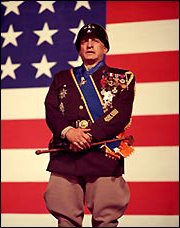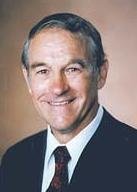Remembering the “Ultimate Sacrifice”
May 26, 2006 Leave a comment
One of my favorite movies of all time is “Patton.” In the opening sequence George C. Scott, in the role of General George S. Patton, steps in front of an enormous American flag and addresses the U.S. Third Army. It is regarded as one of the more famous monologues in American cinematic history. His opening line is classic. For the sake of discretion I will (bleep) out the profanity.
 “Now, I want you to remember that no (bleep) ever won a war by dying for his country. He won it by making the other poor dumb (bleep) die for his country.”
“Now, I want you to remember that no (bleep) ever won a war by dying for his country. He won it by making the other poor dumb (bleep) die for his country.”
Memorial Day is upon us. In the United States it is the day set aside to remember those who have died in the defense of our country. I think it is appropriate to honor their memory. What they did is often referred to as the “ultimate sacrifice.” But as I consider both the phrase “ultimate sacrifice” and General Patton’s thoughts on making the other poor dumb (bleep) die for his country a couple of things occur to me.
First, those whose memory we honor on Memorial Day didn’t intend to die. Were they willing to die? Almost certainly. We’ve all heard stories of how, during the course of battle, someone willingly gave their life for others. Their commitment has never been in question. But I dare say they did not plan to go into battle and never come back. As Patton pointed out, you win by killing the enemy. Every time our side takes a casualty it diminishes our force strength. Besides, they had families to whom they wanted to return. They had dreams for “after the war.” They had a life.
Second, when considering whether or not a sacrifice is the “ultimate sacrifice” several things need to be considered. Obviously the cost: Those who died in battle paid the highest price possible. But what about intent? As I said, they didn’t intend to die. They didn’t plan to pay so high a price. Also, what about the gain? Those who have died in America’s wars have secured military victories. And if their sacrifice has protected others’ rights to life and liberty then they have achieved a noble goal indeed. But is it the ultimate?
In my estimation there is but one “ultimate sacrifice.” Jesus Christ came to earth with the full intention of dying. The plan all along was for Him to give His life so that others may live. And His sacrifice secured for believers something far greater than the life, liberty and the pursuit of happiness articulated in the Declaration of Independence. His sacrifice provides us with eternal life.
I do not, in any way, mean to demean the sacrifice of America’s war dead. I merely want to point out how much greater is Christ’s sacrifice. Think about how highly we esteem America’s war dead. How much more highly, then, should we esteem Christ?
For the Christian there should only be one meaning for the phrase “ultimate sacrifice.”











